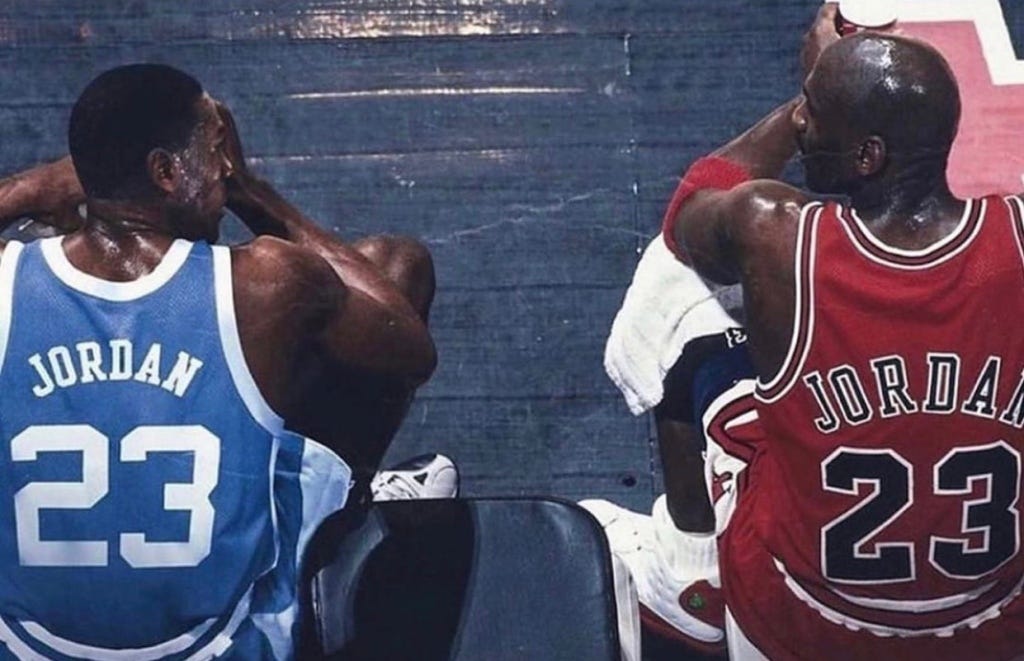The Brightness of Jesus, The Relationship Between Love & Kindness, How To Realize Your Potential
The Disciple-Leader Newsletter #37 // October 7, 2023.
Discipleship. Leadership. Mental Performance.
DISCIPLESHIP
Jesus’ physical appearance has been described by some who’ve seen Him as the following:
“I looked and behold a certain man clothed in linen, whose loins were girded with fine gold … His body also was like the beryl, and his face as the appearance of lightning, and his eyes as lamps of fire … the voice of his words like the voice of a multitude.” – (Daniel, Daniel 10).
“At midday … I saw in the way a light from heaven, above the brightness of the sun, shining round about me … and I said, who art thou, Lord? And he said, I am Jesus.” (Paul, Acts 26).
“We saw the Lord standing upon the breastwork of the pulpit, before us; and under his feet was a paved work of pure gold, in color like amber. His eyes were as a flame of fire; the hair of His head was white like the pure snow; His countenance shone above the brightness of the sun; and his voice was as the sound of the rushing of great waters.” – Joseph Smith
I saw two Personages, whose brightness and glory defy all description, standing above me in the air.” – Joseph Smith
As description-defying as Christ’s physical attributes are, His internal attributes are just as bright and glorious.
Jesus has a perfect brightness of hope (2 Nephi 31:20).
A perfect brightness of kindness.
A perfect brightness of empathy.
A perfect brightness of truth.
A perfect brightness of creativity.
A perfect brightness of grace.
A perfect brightness of compassion.
A perfect brightness of power.
A perfect brightness of ___ (you add the attribute of His, and He has a perfect brightness of it).
Every attribute of His shines above the brightness of the sun.
Think about it: That Being of perfect brightness wants nothing more than to have as close and meaningful a relationship with and connection to you as you'll allow.
What are you waiting for?
LEADERSHIP
Below is a quote by C.S. Lewis. One of the greatest teachings on God, and what leadership really looks like.
By the goodness of God, we mean nowadays almost exclusively His lovingness; and in this we may be right. And by Love, in this context, most of us mean kindness—the desire to see others than the self happy; not happy in this way or in that, but just happy. What would really satisfy us would be a God who said of anything we happened to like doing, ‘What does it matter so long as they are contented?’ We want, in fact, not so much a Father in Heaven as a grandfather in heaven—a senile benevolence who, as they say, ‘liked to see young people enjoying themselves’ and whose plan for the universe was simply that it might be truly said at the end of each day, ‘a good time was had by all’.
Love is something more stern and splendid than mere kindness … There is kindness in Love: but Love and kindness are not coterminous, and when kindness (in the sense given above) is separated from the other elements of Love, it involves a certain fundamental indifference to its object, and even something like contempt of it. Kindness consents very readily to the removal of its object – we have all met people whose kindness to animals is constantly leading them to kill animals lest they should suffer. Kindness, merely as such, cares not whether its object becomes good or bad, provided only that it escapes suffering.
It is for people whom we care nothing about that we demand happiness on any terms: with our friends, our lovers, our children, we are exacting and would rather see them suffer much than be happy in contemptible and estranging modes. If God is Love, He is, by definition, something more than mere kindness. And it appears, from all the records, that though He has often rebuked us and condemned us, He has never regarded us with contempt. He has paid us the intolerable compliment of loving us, in the deepest, most tragic, most inexorable sense.
MENTAL PERFORMANCE
"Every day I demand more from myself than anybody else could possibly expect. I don't compete with other people. I compete with what I'm capable of."
Michael Jordan
Playing to the level of your competition is a saying in sports that describes a player/team who raises and lowers their level of effort and competitiveness based on the skill and effort level of their opponent.
Playing to the level of your competition, for better or for worse, is a hallmark of an undisciplined team. In fact, it is the defining characteristic of the undisciplined.
The root cause of this lack of discipline is pride. Remember what C.S. Lewis wrote, "Pride gets no pleasure out of having something, only out of having more of it than the next man ... It is the comparison that makes you proud: the pleasure of being above the rest."
A lesser competitor gets no satisfaction out of being their best selves, only out of being better than someone else. It's prideful. It's lazy. This is playing to the level of your competition.
In contrast, the greatest competitor gets no satisfaction out of merely being "better" than someone else, only out of maximizing their potential. Or as MJ put it, competing with what you're capable of.
As it turns out, this intrinsic drive to maximize the self is what makes the greats great. With MJ's statement in mind, consider these other statements:
"The joy is in the journey of pushing yourself to the outward limits of your ability ... thus, in all my years of coaching I rarely, if ever, even uttered the word win, talked about 'beating' an opponent, or exhorted a team to be number one ... Instead, my words and actions always reflected (my father's) advice –– 'Never cease trying to be the best you can become ... There is a standard higher than merely winning ... compete only against yourself." - John Wooden
"The most important thing is that you become the best version of yourself. That is the key. Get better every single day. Are you better today than you were yesterday? If the answer is yes, then you're on the right track." - Kobe Bryant
One of Jordan Peterson's rules in his book 12 Rules For Life is to compare yourself to who you were yesterday, not who someone else is today. Comparison, like playing to the level of your competition, is rooted in pride. When you compare yourself to someone else, one of two things happen.
You'll believe you are better than them, thus fueling your ego.
You'll believe you are worse than them, thus fueling your lack of self-esteem.
So compare yourself to who you were yesterday, not who someone else is today. And compete with yesterday's version of you, not today's version of them.
Any other approach will leave you with the worst imaginable result: potential unrealized.
Disciple-Leadership: Jesus-led. Lead like Jesus.






